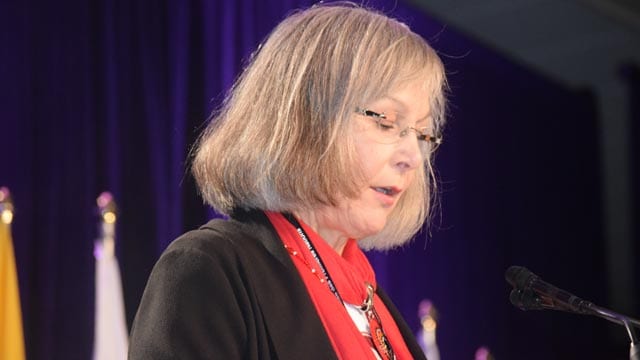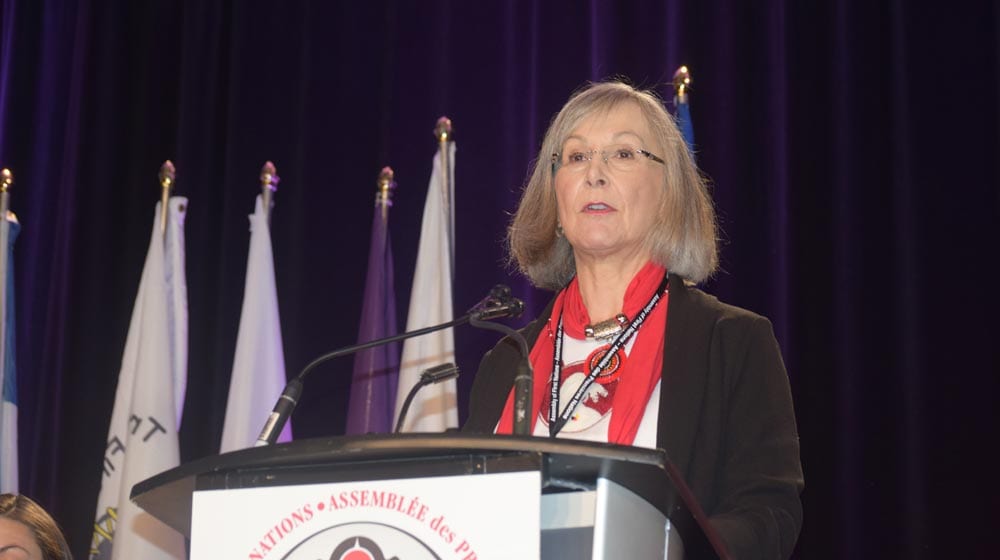

Missing and Murdered Indigenous women and girls inquiry Chief Commissioner Marion Buller says a video of an Indigenous teen being aggressively interviewed by Kelowna RCMP after she reported an alleged sexual assault is typical of what they heard from families and survivors across Canada.
“We also heard about some extraordinarily good police investigations regarding sexual assaults,” she said. “So the sad part is this of one police officer who conducted that interview really doesn’t live up to the standards that other officers set for these types of investigations.”
Buller, who was the first female First Nations person appointed as a judge in British Columbia in 1994, said that though she hasn’t seen the entire interview, she did have some criticisms of the video.
“Back in March of 2012, it was inappropriate to ask – in my view anyway -inappropriate to ask the young woman whether she was sexually aroused even in the slightest degree by the assault,” she said.
“It was inappropriate to ask her to compare this experience with other sexual experiences she might have had. That’s just the beginning of where I could be critical of the interview.”
In the video, the officer asks the woman about her past sexual history and asked if she had a physical reaction to the assault.
“Were you at all turned on during this at all? Even a little bit?” the officer asked. “You understand that when a guy tries to have sex with a female and the female is completely unwilling it is very difficult.”
Buller also expressed concern with the young woman’s lack of adult support. Two MCFD social workers were present with her for a very short period of time during the two and half hour long interview.
“What concerns me is here is a young person, a minor in law who’s being questioned without an adult present,” she said. “My recollection is that if a young person is being questioned by the police as a suspect then their Youth Criminal Justice Act requires that there be an adult present.”
“To me it just seems like common sense that there would be an adult present to act support for the young person.“
Read more: ‘Were you turned on by this all?’: RCMP officer asks Indigenous youth during sexual assault report
She said the video — though just one example — re-victimizes the victim and she understands why complainants may be reluctant to report.
“This can be devastating for an individual who has already experienced a traumatic event to have to go through a process of reporting, seeking justice for what had happened to them not being believed, being demeaned being asked embarrassing questions,” said Buller. “In the case of this young one being punished for reporting the incident to the police and then in the end nothing happens.
“There is no meaningful investigation. So I certainly understand why people who make complaints about sexual assaults to the police don’t bother doing it or decide in the end not to do it after all because of how they proceed. Nothing’s going to happen anyway.”
The national inquiry into missing and murdered Indigenous women is fighting its own battle with the RCMP in court for access to two files the national police force is refusing to hand over.
The inquiry is set to issue its long-awaited report in June, but says it wants the contested Mountie files to complete its work on one of the saddest chapters in Canada’s recent history.
Little is publicly known about the two disputed files other than their titles: “Missing Person: Missing Indigenous Woman” and “Homicide: Murdered Indigenous Woman.”
Both sides have agreed to an expedited process and hope to have hearing dates on the dispute before mid-May in the Federal Court of Canada, said Catherine Kloczkowski, a spokeswoman for the inquiry.
Federal lawyers acting on behalf of the RCMP have yet to make submissions to the court.
For the Indigenous teenager, APTN News has reached out to the Minister of Children and Family Development (MCFD), the RCMP and the individual social workers.
MCFD sent an email saying they are preparing a response but nothing had been received when this article was posted.










